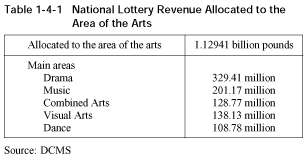| Home > Policy > White Paper, Notice, Announcement > White Paper > Japanese Government Policies in Education, Science, Sports and Culture 2000 > Part 1 Chapter 4 Section 1 1 | ||
The United Kingdom experienced a people's revolution at a relatively early time compared to other countries, and the power of the monarchy has been limited. As a result, compared to Germany and France, arts and culture have not generally been patronized by certain members of the royal family and aristocracy, but have rather been characterized by support from the wealthy classes.
With this background in mind, the U.K.'s present-day cultural policy maintains a certain distance from arts and culture activities, and there is a spirit of respect for their autonomy embodied in the "Arm's Length Principle." Rather, a method of promoting the arts through intermediary organizations such as the Arts Council has been adopted.
The institution charged with cultural administration in the U.K. is the Department for Culture, Media and Sport (DCMS), which was renamed from the Department of National Heritage (DNH) in 1997. The DNH was created for the purpose of taking over the activities of other ministries (particularly the Office of Arts and Libraries which had formed the core of the U.K. cultural administration) pertaining to tourism and media. In FY1998, the budget of the DCMS was 885 million pounds (169 billion yen).
The DCMS allocates direct budgets for national museums and art galleries and the British Library, and also provides support for organizations such as the Arts Council, the Crafts Council, the Museum and Galleries Commission, and the British Film Institute.
Organizations like the Arts Council have the status of independent corporations, and provide support for culture and the arts in their respective fields with funding from the DCMS as their primary financial resource. They are permitted substantial autonomy in their operation. In addition, national art galleries and museums are also permitted to operate independently, including the acquisition and use of their own financial resources as independent corporations.
The major function of the DCMS is to allocate the government's culture budget to these institutions and organizations. In addition, in order to promote the cultural activities of corporations, it has been developing measures to diversify financial resources through the introduction of private-sector funding. For example, when corporations have newly contributed to arts activities, the DCMS since 1984 (previously conducted by the Office of Arts and Libraries) has promoted Corporate Support Promotion Activities that subsidize a certain percentage of those activities.
The DCMS is also in charge of the National Lottery. The National Lottery was initiated in 1994, and its proceeds (minus compensation to national income and the profits of the operating corporation) are allocated to five areas (presently six areas), including arts and culture, historic heritage, and sports. In FY1997, proceeds reached 5.5 billion pounds (1.177 trillion yen), and 170 million pounds (363.8 billion yen) was allocated to such areas. Between the inception of the National Lottery and 1997, a total of approximately 1.1 billion pounds (235.4 billion yen) had been allocated to the area of the arts (See Table 1-4-1 ).

The DCMS is also engaged in the protection of cultural properties. Based on the advice of related commissions, it creates a list of historic buildings that should be preserved, and restricts the renovation and/or demolition of the structures on the list as necessary.
Regarding the protection of cultural properties, there are a number of aid organizations established by law, including the National Heritage Memorial Fund and the Historic Buildings and Monuments Commission. These organizations each conduct necessary cultural activities with grants from the DCMS and other governmental bodies as their primary financial resource. They are also allocated a portion of the revenues from the aforementioned National Lottery. Furthermore, there are voluntary organizations in the private sector such as the National Trust.
Regarding cultural exchange with other countries, the British Council, a special corporation established in order to introduce British culture overseas through activities such as education and training, publishing, English language education, and the arts, is further developing international exchange activities with a grant from the Foreign and Commonwealth Office.
As for Scotland, Wales, and Northern Ireland, budgets are also being disbursed by the ministries of each region for the maintenance and operation of national museums, art galleries, and libraries in each region.
| Back to Top | MEXT HOME |